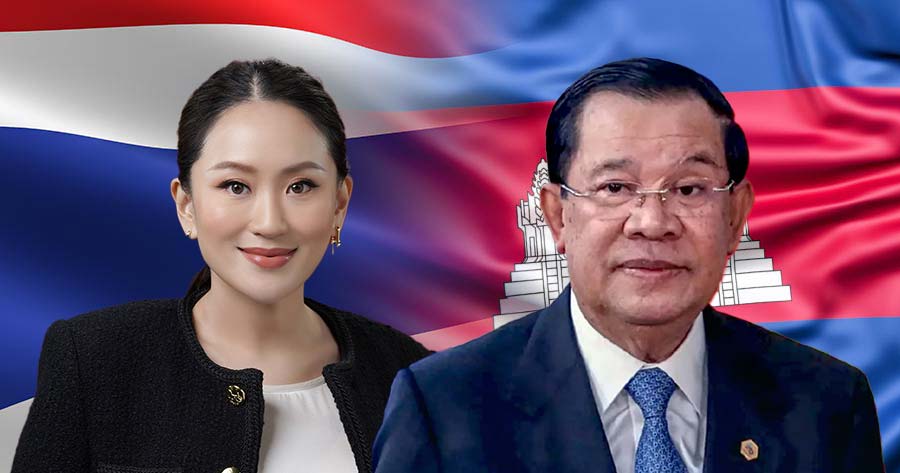The President of the Cambodian People’s Party and Senate—issued a strong statement on social media in response to what he described as a “threatening game” by a Thai opposition party. The party reportedly proposed halting oil exports to Cambodia in an attempt to pressure Phnom Penh into compliance. Hun Sen firmly rejected the threat, declaring that Cambodia would not be devastated by such a move and that the Thai oil company PTT, which has extensive operations in Cambodia, would instead suffer heavy losses.
He pointed to past instances where Thailand allegedly used internet access, electricity, and Cambodian laborers as leverage, and emphasized that Cambodia is better prepared now. Hun Sen highlighted the critical role of Cambodian workers in the Thai economy, suggesting that any attempt to expel them would severely damage Thai factories, farms, and construction.
Calling for a strategic shift, Hun Sen urged the Cambodian government to diversify imports to reduce dependency on Thailand and avoid being vulnerable to future political games. He also proposed halting imports of canned goods—such as energy drinks and canned fish—from Thailand if border gates remain unresolved, advocating for local products or alternative trade partners. He concluded by encouraging Cambodians to take a long-term view of national resilience beyond 2030.
Thailand-Cambodia Trade Data
During January to May 2025, the total trade value between Thailand and Cambodia amounted to 166,018.00 million Baht. Thailand held a significant trade surplus with Cambodia, exporting 144,308.65 million Baht worth of goods and importing 21,709.35 million Baht. This highlights a clear imbalance, with Thailand being a net exporter to Cambodia in this period.
Top 10 Thai Export Products to Cambodia in 2025 (January–May)
1) Jewelry and ornaments: 36.50% share, valued at THB 53,122.56 million
2) Refined oil: 13.75% share, valued at THB 20,011.38 million
3) Refined sugar: 5.15% share, valued at THB 7,499.25 million
4) Beverages: 4.59% share, valued at THB 6,674.84 million
5) Chemicals: 2.55% share, valued at THB 3,709.66 million
Cambodia escalated by requesting the International Court of Justice (ICJ) resolve the dispute over four additional sites. Thailand rejects the ICJ’s jurisdiction, preferring bilateral talks. Both nations have implemented retaliatory measures like border restrictions and boycotts, and deployed troops, fueling nationalist sentiment. The situation remains volatile.
A leaked June 15th phone call between Thai PM Paetongtarn Shinawatra and Cambodian Senate President Hun Sen further escalated the tension between the two countries.
Impact to Thailand’s PTTOR
While recent discussions speculate about a hypothetical scenario where Cambodia might halt oil imports from Thailand, an analysis of PTT Oil and Retail Business Public Company Limited’s (SET: OR) financial structure suggests such a move would likely have only a marginal impact on the company’s consolidated total sales. This assessment is primarily due to the relatively small overall contribution of OR’s Global business segment – which includes Cambodia – to its total revenue.
In the first quarter of 2025 (1Q/25), OR recorded total sales and services amounting to THB 182,422 million. During the same period, OR’s Global business segment, which encompasses operations in the Philippines, Cambodia, and Laos, generated sales and services of THB 14,494 million. This means that the Global business segment contributed approximately 7.95% to OR’s total sales in 1Q/25, as determined in our previous conversation.
Even within the Global business segment, performance varies. For instance, in 1Q/25 compared to the previous quarter, Cambodia experienced a decline in EBITDA, which was attributed to lower gross profit. While its EBITDA improved when compared to the same quarter last year (1Q/24) due to higher average gross profit per litre from aviation fuel and gasoline, the overall Global business EBITDA increase was primarily driven by the Philippines’ performance recovery. The Global business’s overall sales volume growth was led by the Philippines, with significant contributions from aviation fuel and diesel.
Given that the entire Global business segment, encompassing three countries, accounts for less than 8% of OR’s total sales, the individual contribution from Cambodia is inherently a smaller fraction of this already modest percentage. Therefore, any disruption to oil imports from Thailand by Cambodia, while potentially impactful regionally, would represent a minor proportion of OR’s diverse and vast revenue streams.
It is also worth noting that Cambodia’s economy faces its own challenges, including a high dependence on China and the potential impact of “Trump 2.0” trade policies, which include an additional 49.0% tariff on exports that is currently under negotiation. These broader economic factors also play a role in the operating environment for OR’s business in the country.





